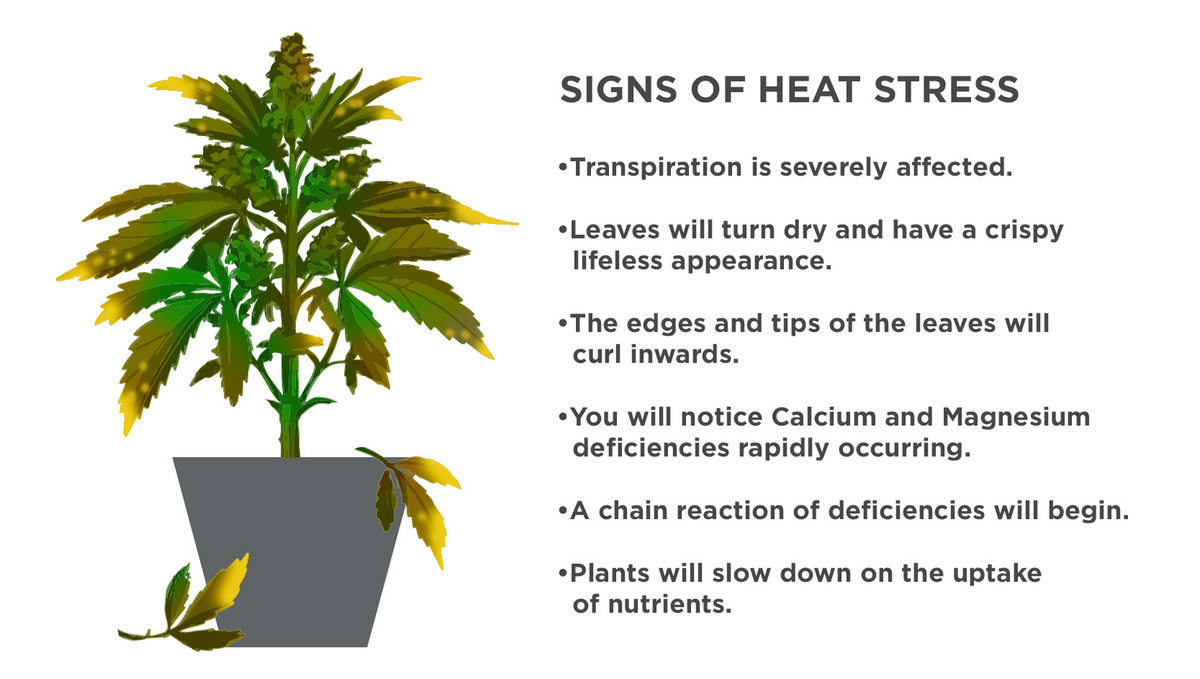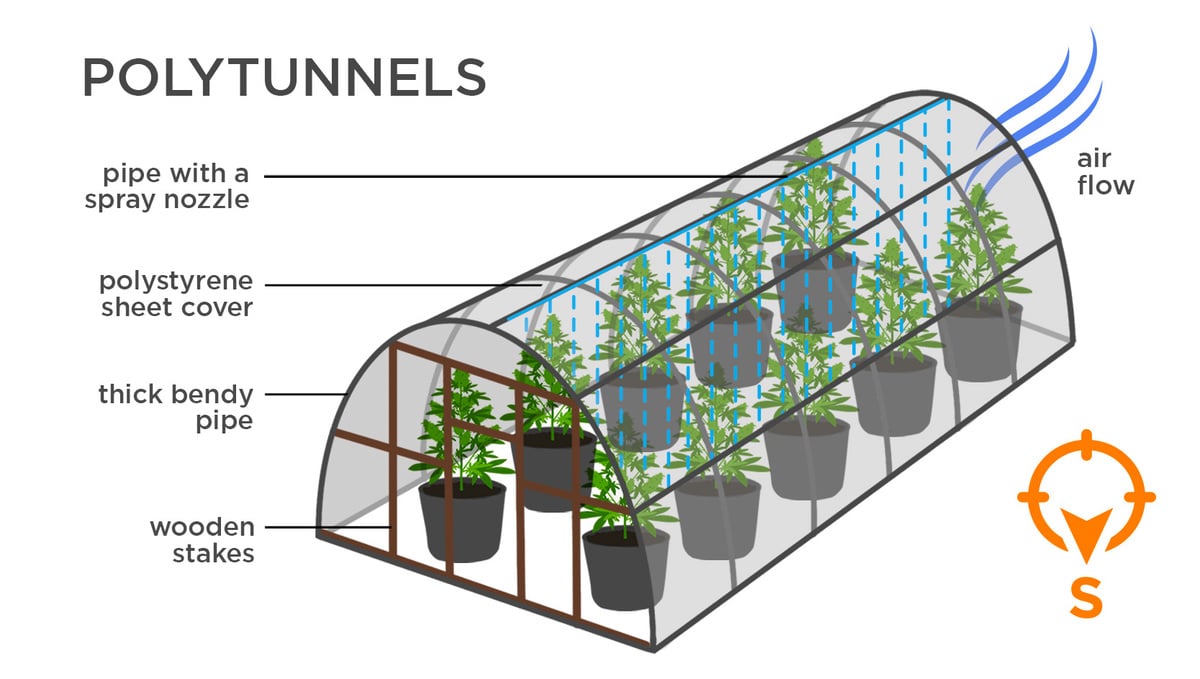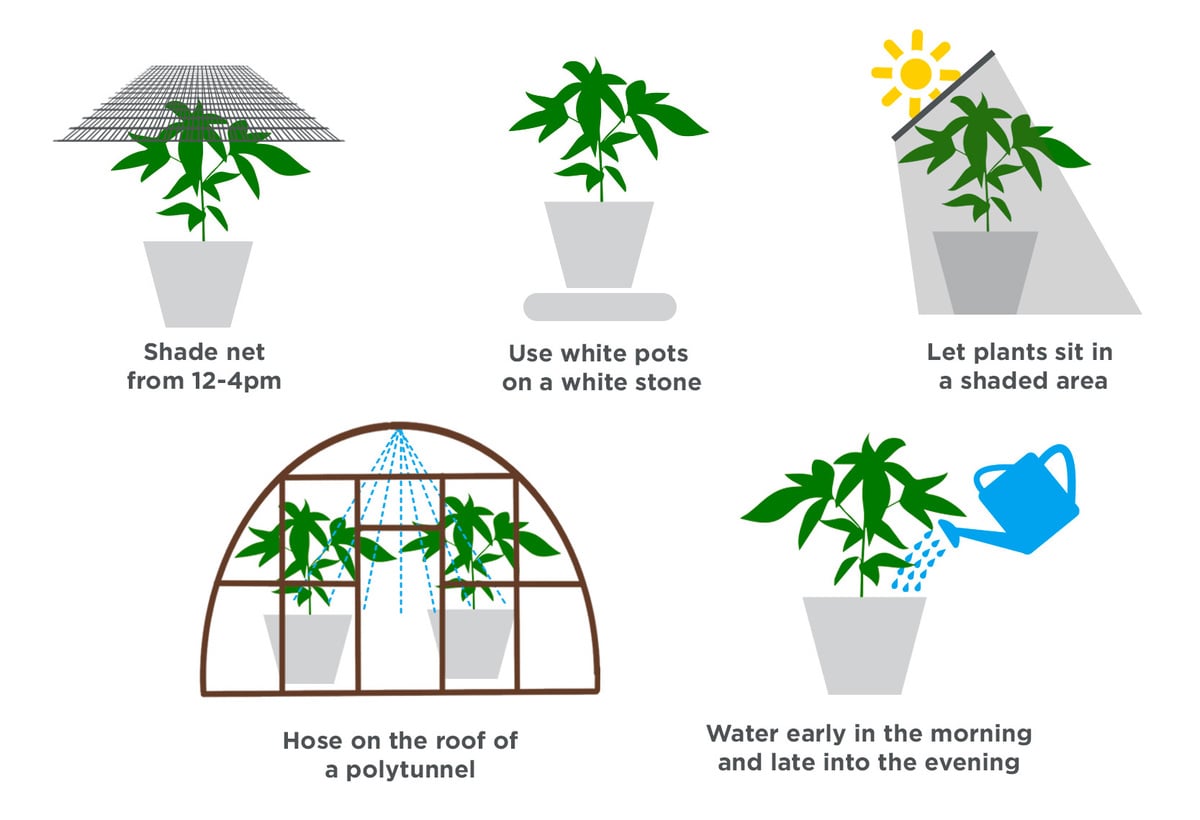How To Protect Autoflower Strains From Heat Stress

- 1. What are the signs of heat stress
- 2. Providing shade
- 3. Polytunnels
- 4. Use white pots
- 5. Top tips on protecting your cannabis plants
- 5. a. Top tips on protecting your cannabis plants indoors
- 6. Other forms of stress to look out for
- 7. In conclusion
Sometimes things such as soaring outside temperatures can be out of our hands, forcing our plants to take on the elements. Heat stress can cause autoflower plants many issues, so in this article we explain the best ways to protect your plants, our top tips and our best strains to grow for those who live in a hot climate.
1. What Are The Signs of Heat Stress
In an ideal scenario, it is advised to grow autoflowering Cannabis indoors at 24 degrees Celsius, with a humidity level of 75% reducing down to 30% during the flowering period. When growing autoflowering plants outdoors, temperatures in Southern Spain, California, and other tropical climates can exceed daytime temperatures of 30-40 degrees on average in the Summer months. It is also conveniently the peak season to grow autoflowering cultivars in any part of the world. A perfect option of an autoflowering strain for all climates without any doubts is Orange Sherbet Auto, she performs extremely well especially in Mediterranean, California and South America leaving you no options to fail.

As Cannabis plants transpire water through their roots or foliage, when there is an unexpected spike in temperature the outcome will be a reduction in the amount of water the plant consumes. As a defense mechanism, Cannabis plants will reduce the amount of direct sunlight they receive, resulting in a drop in photosynthesis, the conversion of sugars, and the uptake of nutrients.
2. Providing Shade
Just because Cannabis plants will not be receiving direct sunlight, it does not mean they are not getting plenty of light, in accordance with CO2 and nutrients. It is much better to provide shade for your plants and allow them to adapt than stress them by intense sunlight. It's important to choose strains that can be resistant, adapting well to extreme conditions, like Original Auto Jack Herer or Purple Lemonade. They perform extremely well indoors or outdoors and can endure heat stress with no issues. Some other cultivars may be more sensitive and need assistance with keeping cooler.
Now, this does not mean you have to shade your plants the entire day, only during 12-4pm when the daytime temperatures are at their most brutal. There are a few different ways to shade your plants and it can be something as simple as a large mosquito net, or very thin fabric.
3. Polytunnels
Building a short-sized polytunnel to keep your autoflowering plants inside, is a wonderful way to grow autos all year around. Building the tunnel is half of the fun than planting your organic crops, inside is where the magic really happens. On the basis, you have used the right materials and it is structurally sound, that way the tunnel will stand the test of time, being able to withstand heavy rain, excess heat, wind, and snow.

- Build your own polytunnel using wooden pallets as the base, polystyrene plastic, and plastic piping.
- Make sure your tunnel is South facing to receive as much sunlight as possible.
- An excellent way to keep your autoflowering crop out of sight.
- It is very easy to attach a hose pipe with a spray nozzle inside the tunnel.
- Polytunnels are great for allowing air to pass through each side keeping things cool.
4. Use White Pots
One of the downsides to growing with black plastic pots is they can absorb the sunshine and cause a serious increase in temperatures around the roots. Using white-colored pots do a much better job of staying cool even during the hottest parts of the day. Floor tiles can also become too hot to walk on at certain times of the year, so a good way to protect your roots from cooking on a hot patio floor is to simply raise them onto a white stone slab, or a layer of white stones. The white stone will remain cool and ensure the air around the base of the pots is much more comfortable for the plants.
5. Top Tips On Protecting Your Cannabis Plants
1. If you experience hot and dry conditions with temperatures over 28 degrees celsius, invest in a shade net and cover your plants during the hottest parts of the day from 12-4pm.
2. Using white pots and sitting them on a white stone, will make a massive difference to the temperatures of the root zone when growing outdoors on a balcony or terrace. Especially, during June to August time.
3. Setting up a hose on the roof of a polytunnel with sprinkler nozzles attached will allow you to increase humidity levels and keep temperatures lower.

4. It is much more beneficial for the plants, letting them sit in a shaded area without stress than trying to get as much intense sunlight in. When conditions are unfavorable to Cannabis plants, it can be a short amount of time until signs of heat stress occur.
5. If you are going to water your outdoor autoflowering plants, it is better to do it early in the morning and late into the evening. The temperatures will be far more comfortable and less demanding on the transpiration of the Cannabis plants.
Top Tips on Protecting Your Cannabis Plants Indoors
Now, when growing autoflowering cannabis plants indoors it can be much easier to protect your crop from heat stress if you have specific pieces of equipment in there to help keep the right growing conditions at all times, so here are a couple of tips to help you protect your plants from heat stress:
- Use AC units and/or fans. Fans will help you exchange hot, stagnant air for fresh air that will also help cool down your grow tent or grow room. And if you can afford it and your grow tent is big enough, you may want to consider investing in an AC unit to prevent heat stress, especially if you live in a hotter climate.
- Adjust light height and intensity. The main cause of heat stress when growing cannabis indoors is the grow lights, so make sure to have enough space from the plant canopy to the light fixture or consider investing in LEDs that output less heat in comparison to HIG light bulbs.
- Get an exhaust system. Ventilation and air exchange are essential for healthy plant growth so if you need to keep the air fresh and cool, an exhaust system will prevent stale air in the tent.
6. Other Forms of Stress to Look Out For
While heat stress is a very important issue to look out for with any cannabis crop, it's certainly not the only environmental stress that we have to be mindful of as cultivators. There is a whole range of other stresses that can be just as damaging, if not more so than heat. The first this you need to think about is the cold, especially if you are growing outdoors. Temperatures that drop too far below freezing can stunt or even kill the plant. If you are growing outdoors in a colder climate, be sure to provide your plants with some form of shelter or protection from the cold.
Light stress is another big one to watch out for. Autoflower strains require a lot of light and if they don't get enough, they can suffer from stunting and slow growth. Make sure you are providing your plants with adequate lighting throughout the day, or supplementing natural light with artificial lighting, to ensure that your plants get the light they need. Humidity and moisture levels play a huge role in how your auto flower strains develop and it's important to ensure that the environment you are creating for them is not too dry or too wet. Too much humidity can cause bud rot and mold, while too little will result in poor growth and unhealthy buds.
If you are growing in a soil mix, It is also important to ensure that the nutrient levels in the soil are not too high - as this can result in nutrient burn which can stunt the growth of your autoflower strains. Everyday potting mixes are usually too high in nutrients for cannabis plants, especially seedlings. Make sure you always go for a cannabis-specific blend if at all possible. If you can get your hands on a cannabis-specific blend, add some inert amendments such as coco-coir and perlite to the soil to decrease the nutrient saturation.
Make sure you are testing for proper pH levels and giving your plants just enough nutrients to keep them healthy and thriving. It is also important to keep an eye out for pests and diseases which can easily ruin a crop. Keep your plants clean and make sure you are regularly checking them for any signs of infestation or disease, including powdery mildew or spider mites. If you do notice any signs of trouble, treat them immediately with the appropriate measures and act quickly to save your plants. Finally, keep an eye on the size of your autoflower strains and make sure they are not too crowded or left without adequate space between them. Crowding can cause air circulation issues which can lead to mold and mildew problems, as well as other nutrient deficiencies that can stunt growth.
7. In Conclusion
When temperatures can exceed 40 degrees in some parts of the world during the summer, doing all we can do to keep our crops as happy as possible can be an arduous task. Even though autos are light and nutrient-hungry cultivars, knowing when to step in with the right amount of protection can be a big difference maker between a high grade and low-quality crop.







Comments